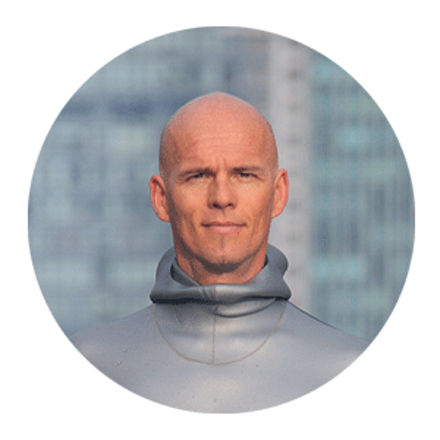IN MY ELEMENT - OXYGEN
Oxygen is a vital requirement for human life. We take in this element as part of the air we breathe. But we breathe more than we actually need to. It’s similar to driving to the gas pump even though the tank is not yet empty. The more we breathe, the more oxygen we need, because breathing requires energy.
In freediving, it’s crucial to consume as little oxygen as possible. The precondition for that is to be relaxed, so that you can dive to great depths without requiring additional air from a compressed-air cylinder. That’s why I put my body into an energy-conserving mode and my mind into a dozy state.
First, I dive down and come up again several times. That way I activate the diving reflex, which slows down my heartbeat, among other things. I don’t have any thoughts, and I block out everything around me. During competitions, that means the cameras, umpires, and audience. Adrenaline also increases oxygen consumption. And the resolution “Now I’m going to make an especially deep dive” increases it even more.
When you’re freediving, your strength comes from serenity. I try to go down to the depths with as few movements as possible. Movement costs you oxygen. It’s like climbing a flight of stairs: If you start off too fast, you’ll be out of breath after just one flight.
Most people assume that the air they breathe is oxygen. However, only 21 percent of the air we breathe is oxygen. The biggest component of it is nitrogen. When you’re in the depths, it has a narcotic effect. You feel as though you’ve drunk one beer too many.
This feeling of drunkenness, plus my relaxed state, became almost fatal for me when I was attempting to set a record in 2012. While I was resurfacing from a depth of 253 meters, I briefly fell asleep. When I had reached a depth of 26 meters, my sled, which had taken me to the depths and pulled me up again, made a planned stop. The rescue divers brought me to the surface without making a decompression stop. They thought I had fainted. Without this stop, the nitrogen that has dissolved in your blood is released as tiny gas bubbles that block your blood vessels. Your brain stops receiving oxygen. I suffered multiple strokes and lay in a coma. The doctors’ forecasts were pessimistic, but I fought my way back to life, and back to water.
Two years after this accident I started to dive again—just for fun and, as always, without a compressed-air cylinder.”


»I don’t have any thoughts, and I block out everything around me.«
Herbert Nitsch is one of the most successful freedivers. He has set 32 world records in all eight international apnea disciplines.

